Welcome to Screen Week! Join us as we explore the films and TV shows that kept us staring at screens. More from this series
It seems funny — Girls-level funny, not Nathan for You-level funny — to have a television list as a prelude to a film list in 2015. Yes, the Star Wars reboot has already made more money than any piece of media ever. Sure, indie directors like Joel Potrykus and Nathan Silver are still taking risks that are unheard of in the TV format. But in our daily lives, most of us have always spent more time in our living rooms than in a theater. TV intertwines with our everyday lives — adjusting itself to our post-work schedules, our spaces of domesticity — while movies, instead, offer a respite from them.
For a long time, it seemed like common sense that the kind of criticism we do here at Tiny Mix Tapes was best suited for the more clear-cut spatial, temporal, and social boundaries of the big screen’s discrete filmic texts. But the caliber and diversity of shows on our list of favorite TV from 2015 — our first year-end TV list! — suggests that our reticence to delve into television probably had more to do with our embarrassment at how much time we spent on the couch than our embarrassment at the state of TV.
The recent technological and (de)regulatory changes in how television gets into our homes might be the most impactful shift to what kinds of stories we watch, and what formal qualities they take on, since sound was paired with film in the late 1920s. The oft-discussed golden age of television we’re living in could also be called the death of television — or at least the death of most of what has historically defined TV as TV — and it’s this constant, repeating self-destruction that’s making the medium so vibrant. Season-length storytelling arcs — the foundation of prestige dramas like The Sopranos that made snobs like me start thinking TV was important — were rare not that long ago, and it’s hard to imagine our list without them (Better Call Saul, Halt and Catch Fire, The Americans, Mad Men).
But our list doesn’t just highlight the refinement of prestige dramas through stunning, auteurist direction (The Knick, Hannibal) or through doing that one thing that’s always been so difficult for TV: absolutely nailing an ending (Mad Men). It also makes the case that the dominance of the “serious drama” genre (that itself ushered in this new age of TV) is already fading, or at least learning to share the spotlight.
We were overwhelmed this year by quality TV’s proliferation of new forms and genres: cartoons for adults (Rick and Morty, Bojack Horseman), romcoms that deftly handled mental illness (You’re the Worst) and black comedies that were more day-glo than dark (Unbreakable), multi-show universes (Daredevil and Jessica Jones, not to mention Better Call Saul maintaining continuity with Breaking Bad). Perhaps most surprisingly, TV in 2015 educated us, making heart-wrenching, detailed cases for IRL policy reform that somehow pulled off the unheard of trick of swapping didacticism for entertainment value (Making a Murderer, Show Me a Hero).
All of this is to say: as TV shows became more complex and better looking a few years ago, we — like a lot of people — called them “cinematic.” Television in 2015 — especially our #1 pick — suggests that we might, someday soon, start calling good movies “televisual.”
30
Veep
Created by: Armando Iannucci
[HBO]
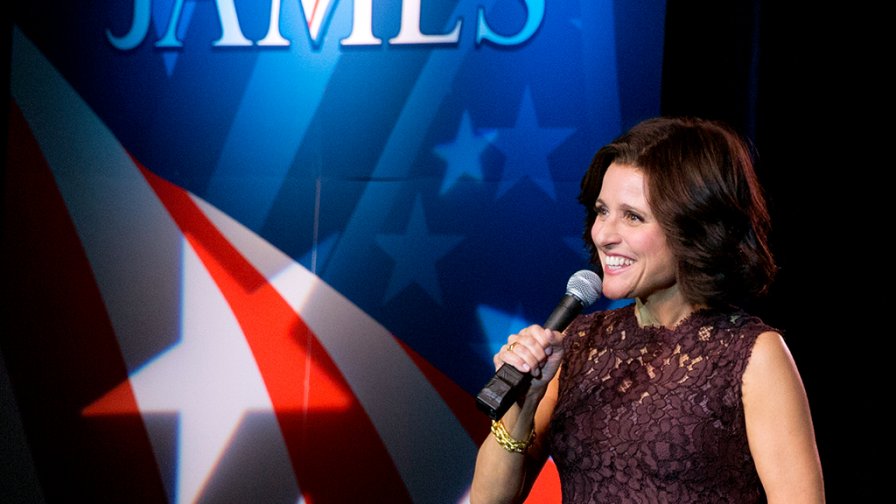
What kingdoms are there left to conquer once you’ve secured the highest office imaginable? As always, in Selina Meyer’s case, the real question isn’t actually about what more you can achieve, but what you can do to broadcast your falsified image as an achiever. With the Meyer Administration in full swing this season, Veep pulled a 180° turn, shifting our ensemble’s pressure away from constantly covering up Selina’s PR blunders and toward ensuring that no other candidates usurp her questionably gained throne in the upcoming election. Especially with the introduction of good-willed senator Tom James (played pitch-perfect by Hugh Laurie), the entire cast was put under a magnifying glass this season, being held accountable for their never-ending sliminess rather than remaining caught in D.C.’s soulless echo chamber. Although showrunner/mastermind Armando Iannucci will be bowing out for the foreseeable future, with season 4 of Veep, he left us with his most bare caricature of the political scum elite yet: guilty, weak, paranoid, and of course clueless.
29
Girls
Created by: Lena Dunham
[HBO]

The recent news that Girls would be coming to an end in another two seasons was uncommonly shocking to hear. Have we even been on a trajectory this whole time? What exactly have any of us learned? Setting a start and end point on something as ineffable as your youth seems unthinkable, but maybe it’s because our lives and memories never really had a firm first moment to begin with. First, there was nothing, and now you’re 25. Suddenly, here was Hannah completely cut off from her life in the city, chasing some antiquated career goal at a school she hated, while Marnie, Shoshanna, and Jessa all chased their own failing dreams of companionship and fulfillment. Two seasons is a healthy distance to go, but there it is on the horizon, like the big 3-0, the end of days where your confusion is expected rather than a matter of public concern. If Lena Dunham inflicted anything upon us this season (besides that tongue-piercing scene, easily the most uncomfortable 40 seconds of television I’ve ever sat through), it was the feeling of the slow decline, the view of the peak from the other side. But it came with the realization that perhaps there is another summit waiting for us, one we can’t see, one even more thrilling and humbling than we’re even capable of understanding yet.
28
Catastrophe
Created by: Rob Delaney & Sharon Horgan
[Amazon/Channel 4]
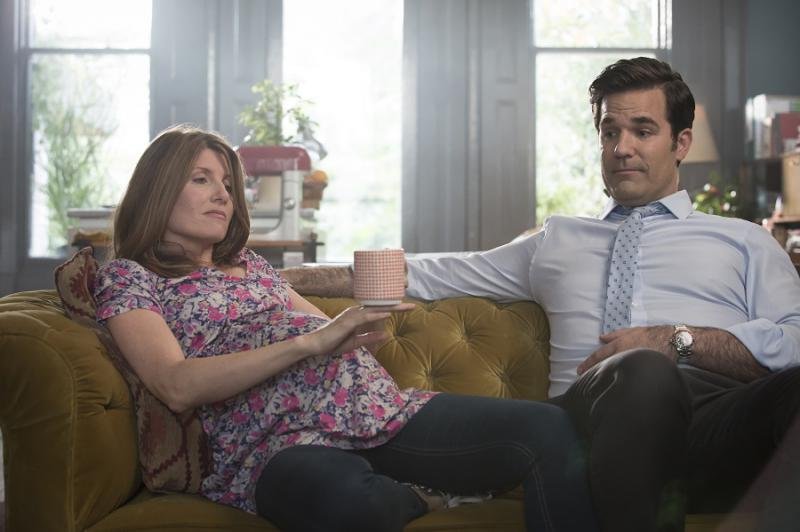
Most on-screen romances are about falling in love. Catastrophe, the incredibly sharp comedy that had its American debut on Amazon Prime, is all about the ever-after part. The series is about Rob (Rob Delaney) and Sharon (Sharon Horgan), strangers who meet in London and embark on a week-long fuck fest. Sharon later tells Rob that she’s pregnant, so he decides to upend his life in the United States and start a family. In only six short episodes, Catastrophe uncovers poignant, ugly truths about relationship, maturity, adulthood, and above all parenting. The humor is mostly wry but occasionally gut-busting: in particular, I love how one character describes the resentment he feels toward his wife for having seen her vagina during child birth. But what makes it a great show is not its comedy, but its drama. The arguments and heartbreak are deeply effective, which makes it all the more rewarding to see just how Rob and Sharon might make it.
27
Fargo
Created by: Noah Hawley
[FX]

Naïve arrogance and stoic resolution. “It’s just a flyin’ saucer, Ed.” Bodies stack up around the characters of Fargo, and they carry on like nothing’s wrong. Maybe that’s the best you can do: when death is staring you in the face, you try to ignore it. Rye Gerhardt, Simone Gerhardt, Ed Blomquist, Peggy Blomquist, Mike Milligan, Betsy Solverson, and on: Is there a character on this show not touched by death in some manner, either actual or spiritual? Fargo is most often a meditation on the absurdity of the mundane, but it’s also about how a single step in the wrong direction can have immediate and brutal consequences. Life is heavy like that. Sometimes Fargo feels like The Turin Horse with comic relief. That Camus’s “The Myth of Sisyphus” comes up in passing between two characters feels completely natural — not for the characters themselves, but for us sitting outside of the action. We already know this is the same show where Gus Grimly’s neighbor from season 1 told him a parable about a wealthy man slitting his own throat in a bathtub over feeling incapable of positively impacting the world. But we also know it’s the kind of show where Ronald Reagan can sidle up to you in the restroom for an awkward piss.
26
The Leftovers
Created by: Damon Lindelof & Tom Perrotta
[HBO]

Season 2 of HBO’s The Leftovers only relates to the book through repeat characters, as not very much of the novel’s storyline is portrayed after season 1. Outside of the series’ enthralling soundtrack, season 2 forgets about the gravity of losing one-third of Earth’s population to *evaporation* by washing it all over in the victimless town of Miracle, where nobody vanished on October 14, 2011. Instead, season 2 focuses on the slowly deteriorating and increasingly terrorized Americana of post-disaster US. Adding a missing-persons sleuth, male characters disemboweling themselves (naturally), and females patiently gaining the upper hand of every situation, season 2 of HBO’s The Leftovers presents the perfect flow from “No fucking way” to “No fucking way?” But legitimately. And without mercy. I cried the last four episodes straight. It was heavy.
25
Hannibal
Created by: Bryan Fuller
[NBC]

Disassociation, violation, revelation. This is the arc many of Hannibal’s major characters followed, at the behest and the ineffable control of the men pulling the strings (Mads Mikkelsen’s Lecter, showrunner Bryan Fuller). Will Graham (Hugh Dancy) lost half of his brain and everything he loves, but then found a more philosophically compelling, morally seductive reason to be. Alana Bloom (Caroline Dhavernas) fell for a serial killer who tried to murder her and emerged crippled, heavily styled, and queered, devoted to the only woman whose taste for vengeance was greater than hers. Bedelia Du Maurier (Gillian Anderson), who knew better, made herself a prisoner to him, concocting her own final meal in his image. Once an audacious procedural, long stretches of Hannibal’s final season were rapturously untethered to time, content to trace the melting identities of its characters through sites of trauma and back out into grotesquely playful schemes and mindfucks. Few shows have made such an emphatic case for the primacy of aesthetics. Once Hannibal developed into one of the most aurally and visually stunning works on television, the show became a farrago. Beauty was both subject and method, and the only way to survive Hannibal was to submit to him and submit to it.
24
Transparent
Created by: Jill Soloway
[Amazon]

In Hebrew, the name Maura can be translated as the female conjugation for teacher. And while Maura Pfefferman is still learning how to navigate the world as a woman in season 2 of Transparent, she (by way of creator and suspected lamed vavnik Jill Soloway) provided a seemingly endless supply of teachable moments for her children, friends, and ex-wife — and for those of us in the audience, too. But even as the show became soapier — not to mention, more acclaimed and therefore more scrutinized — it kept its distance from the intersectionalist’s soapbox, choosing instead to focus on the ways that ideologies keep us divided, sometimes irreconcilably, but without losing focus on the inherent humanity of its characters, who are all trapped in nettlesome cycles of identity politics, regardless of their chosen gender expressions. Even more than in season 1, Transparent remained committed to a practically Talmudic style of discourse, fearlessly confronting ideological fallacies, sagaciously answering questions with questions, and expertly avoiding foregone (narrative) conclusions. And so while Transparent wasn’t necessarily the best TV show of 2015, it was definitely the most Jewish; Baruch Hashem for that.
23
Broad City
Created by: Ilana Glazer & Abbi Jacobson
[Comedy Central]

Broad City’s Abbi Jacobson, quieter in the first season compared to Ilana Glazer’s instantly bubbly character, was the MVP in season 2 — from her Vicodin-fueled trip around Whole Foods and the glorious revelation of her secret persona to her night with Kelly Ripa and a bottle of moonshine. While these moments highlighted Jacobson’s skills to carry a scene without her counterpart, Broad City was at its strongest when its two leading ladies took on the town together. The duo’s uninhibited BFF dynamic recharged tired tropes of twenty-somethings struggling through millennial self-absorption on television. Down with Hannah and Marnie’s contrived wriggling to Robyn’s “Dancing On My Own” on Girls, up with Abbi and Ilana under a blanket, eating pizza on the sidewalk, sharing their accomplishments and goals for the future (Ilana: “I want to gradually lower my dosage of anti-depressants, and I want to join Ancestry.com.” Abbi: “I finally masturbated above the covers without my eyes being closed. That was a really big journal entry.”). Also, Glazer and Alia Shawkat sniffed each other like dogs and basically Lady-and-the-Tramped a cannoli this season. Perfection.
22
Jessica Jones
Created by: Melissa Rosenberg
[Netflix]
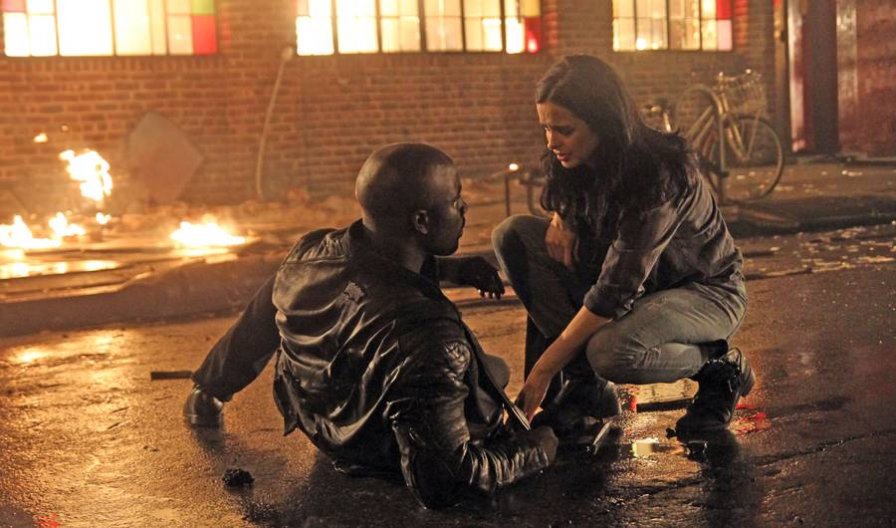
It would seem anything worth saying about the dark entrails of Jessica Jones has been covered en masse. So let me offer an overlooked thread to a show worth a million headlines: weakness. Where brother-in-arms Daredevil discussed vulnerability as a strength and a testament toward initiating change, Jessica Jones was weighed down and burdened by her powers, feeling as if she owes the world for her gifts. Jessica Jones’s weaknesses were numerous, not to mention her past with Kilgrave’s mind manipulation. Trish Walker’s weakness for family not only sucked her into the Kilgrave vortex, but left her exposed to Will Simpson’s rages and her own mother’s abusiveness. Jeri’s killer instinct was in fact her greatest weakness, costing her more than she ever gained as a high-powered attorney. Kilgrave is a victim to vanity and desire; so enamored and engrossed in Jones that he is in essence controlled by what passes for romance. Simpson is a soldier, always weak to manipulation from superiors. But Luke Cage, despite his superpowers, is the weakest of all: vain, impulsive, and unforgiving. Yet Jessica Jones makes no attempt to cure these characters of these weaknesses, to have them overcome them like Matt Murdock, Karen Page, and Foggy Nelson. Those weaknesses are not strengths, but rather a lifetime sentence, a reminder that what doesn’t kill them now may eventually kill them.
21
Last Week Tonight with John Oliver
Created by: John Oliver
[HBO]
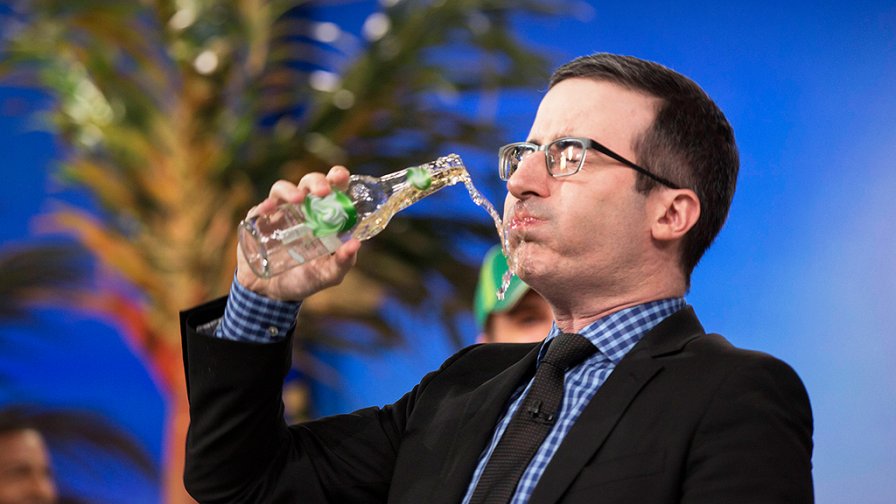
Throughout the first season of Last Week Tonight in 2014, it was obvious that John Oliver and his crew were still trying to put the pieces together for what the show could and should be, while still scoring amazing hit points with deep dives into net neutrality, the militarization of the US police force, and the terror that the LGBT community faces in Uganda. There were no such growing pains this past season, as the show hit its stride and never looked back. Oliver and co. circled around some sizable and unnerving concerns facing the world — with particular interest in the vast prison-industrial complex in the US — but they always injected their reporting with humanity and plenty of wry (and often bawdy) wit. They even found time to send their host to Russia for a sitdown with Edward Snowden, the poster child for the Wikileaks age. Alongside Larry Wilmore’s potent work on The Nightly Show, Last Week Tonight has given a new lease on life to news-driven, sociopolitical comedy. Praise be unto Megareverend John Oliver and all who sail with him.
20
Daredevil
Created by: Drew Goddard
[Netflix]

In 2015, Netflix both entered and dominated the superhero genre. What many big-budget major studio productions seem to have forgotten (or never even knew in the first place) is that superhero origin stories are interesting and compelling insofar as they explore the internal psychological turmoil and the moral dilemmas of the protagonists dealing with their strange and unusual powers. An origin story should not serve as a mere backdrop for overdrawn action sequences two thirds into a film. Daredevil’s skillfully-constructed, stripped-down narrative gets right what makes superhero comics so fascinating by focusing on the human aspect of the characters and their challenges (especially from what is possibly the best rendition of Kingpin, with a larger-than-life performance from Vincent D’Onofrio). Moreover, the down-to-earth topic of real estate speculation comes as a refreshing change from galactic battles and billionaire superheroes. Yes, it’s good times for comic book aficionados: 2015 also saw the release of Jessica Jones (from the relatively unknown and very adult-orientated comic Alias), and in 2016, we expect to see Daredevil season 2 (with an appearance by The Punisher), Iron Fist, and Luke Cage, with Netflix further expanding their roster of gritty, morally-flawed superheroes micro-managing the fuck out of Hell’s Kitchen.
19
Looking
Created by: Michael Lannan
[HBO]

For two seasons, Andrew Haigh and Michael Lannan’s Looking held a mirror up to contemporary twenty-something lifestyle. Self-centered, self-deprecating, and hot as hell, the characters of Looking made bad jokes, they made good jokes — they made mistakes. But it was the consistent quality of the writing, direction, and performances that elevated the show above similar dramas focused on trendy adults doing trendy things in a trendy city. It wasn’t always easy to watch, but it was always enjoyable. Season 2’s highlights included a cringe-inducing Halloween toast, a cumshot to the eye, a haircut that stood for more than a haircut, and perhaps the most inspired soundtrack selection on TV. Despite a great first season and an even better second that widened the narrative scope and delved deeper into characterization, Looking was cancelled following the second season’s finale. But perhaps that’s fitting — we never deserved Looking. As a viewing public, we took Looking’s devotion and honesty for granted, and it will forever be the one that got away.
18
Louie
Created by: Louis C.K.
[FX]
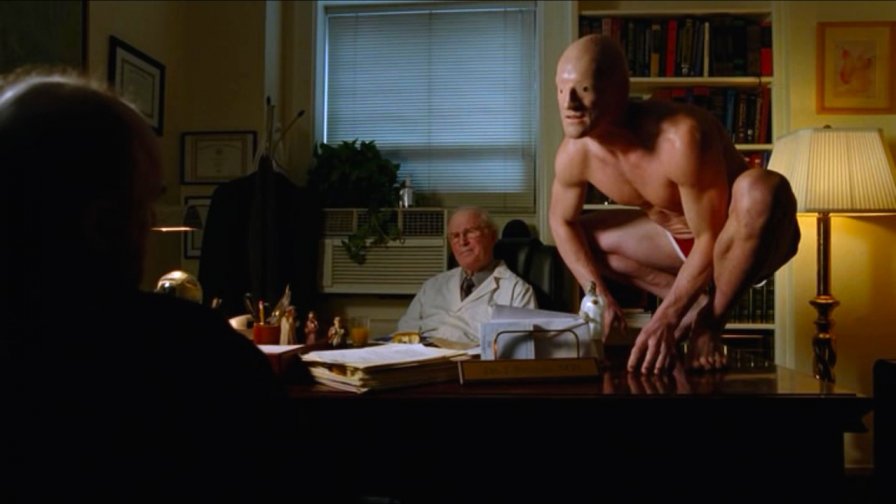
What could’ve just been another stand-up vanity project or life-meets-art cringe comedy has shown itself to be a thoughtful, harrowing, and (we dare say) life-affirming work of art. There continues to be more unresolved issues than revelations and more downs than ups, but there is also a resilient joie de vivre humming underneath every frustrated-to-apoplectic interaction. More than the lifestyle of a comic, these are stories of varying sizes about pushing through life when one is flooded with vivid yearning and fresh vexation at nearly every turn. Also, much like fellow 2015-stand out High Maintenance, there’s a refreshingly patient, warmly detailed care taken with mundane activity (like watching Louie make fried chicken). After five seasons of relentless narrative self-flagellation and vitriolic rant-based allegory, Louie somehow continues to be a freewheeling, yet endearingly signature staple. And with the slightest hint (perhaps the most staticy anti-romance ever) of requite from the extraordinarily capricious Pamela, a hilariously random toilet-related death, and the actually terrifying “Awful Being” in episode 5, this season showed no signs of inspirational fatigue. Rather than sulk about the hiatus, we’d do well to revisit and savor the spoils of his quietly heroic efforts thus far.
17
Inside Amy Schumer
Created by: Amy Schumer
[Comedy Central]

When one of Amy Schumer’s characters took a break from her multiple jobs to make squid ink paella for her freeloading beatboxing boyfriend, a friend told her, “You’re better than this.” “No I’m not,” she smiled, and kicked the friend out. Another character dragged her male co-workers to a strip club and ended up volunteering to bury a dead stripper just to prove she was “cool with it.” In 2015, the writing on Inside Amy Schumer took a quantum leap and grabbed the white light torch of zeitgeist TV comedy; while it was less formally daring than benchmark-setters like Tim & Eric or Portlandia, it took the novel tack of directing its satire not so much at perpetrators but at painfully relatable, willing victims desperate for love and approval. Amy herself played these victims, essentially putting her stories in first person and saying “This is me, this is us.” Meanwhile real-life Amy gave few fucks about her weight and owned her real-person sexuality in all its well-meaning, messy vulnerability and confusion, proud that she could always catch a D.
16
Unbreakable Kimmy Schmidt
Created by: Tina Fey & Robert Carlock
[Netflix]
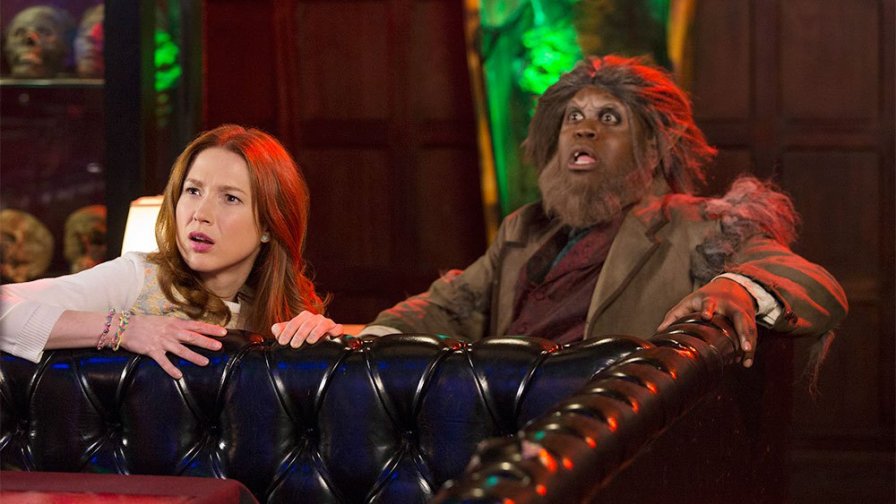
With Tina Fey’s move from network to Netflix, the comedy got deeper and stranger. The show countered the usual cult survivor narratives of triumph or tragedy with its bizarre blend of sarcasm and sunny charm, finding new ways to celebrate the magic and grime of New York. It turns out that Ellie Kemper’s Kimmy Schmidt, a doomsday cult escapee who lived for years in an underground bunker, was perfectly suited to life in the Big Apple. Bright and perky in her day-glo wardrobe, she was resourceful with small spaces, unfazed by (pizza) rats, and able to find true friendship with a random roommate. It was occasionally tone-deaf (Jane Krakowski’s Native American origin story?), unevenly brilliant, and all the more interesting for it. And it gave us two super catchy songs, the auto-tune viral video remix theme and Titus Andromedon’s Peeno Noirrrrr! We hope there’s more of this kind of silly, freaky comedy in season 2.
15
The Americans
Created by: Joe Weisberg
[FX]

Increasingly, nontraditional platforms (Netflix, Hulu, Amazon) are releasing full seasons of TV shows at once, employing techniques to maximize the addictive potential of bingewatching (mainly because they’re selling subscriptions, not ads). Shows on traditional and cable networks, attempting to cash in on some of that addictive viewer behavior, craft progressively more insane cliffhanger endings, hoping that kind of cheap trick will sustain viewer interest for six full days before the next episode drops. That kind of unrepentant cliffhangerism tends to leave a bad taste in our mouth, so it was fitting that a throwback to a bygone era would also so thoroughly capture the excitement and sustained tautness of television that had to put in the work to actually capture your attention from week to week. The Americans has been quietly but steadily building a seemingly impossible amount of tension into every episode since its debut in January 2013. Beyond its sensational premise and undeniably virtuosic performances, what draws us so steadfastly to this series is the phenomenal way it manages to maintain such a compelling story inside a unifying and impossible premise over multiple seasons. With its most recent, season 3, Joe Weisberg and company drew us into a complex and evolving web of deeply flawed human relationships whose complexity and tension were maintained even amidst some pretty big reveals. After all, how often is it that a show that’s made such a big deal about keeping certain characters in the dark can seamlessly move on into even more intriguing stories after the lights come on? We’re waiting to see what they do next, because we’re almost positive it’s going to be even more intense.
14
You’re The Worst
Created by: Stephen Falk
[FX]
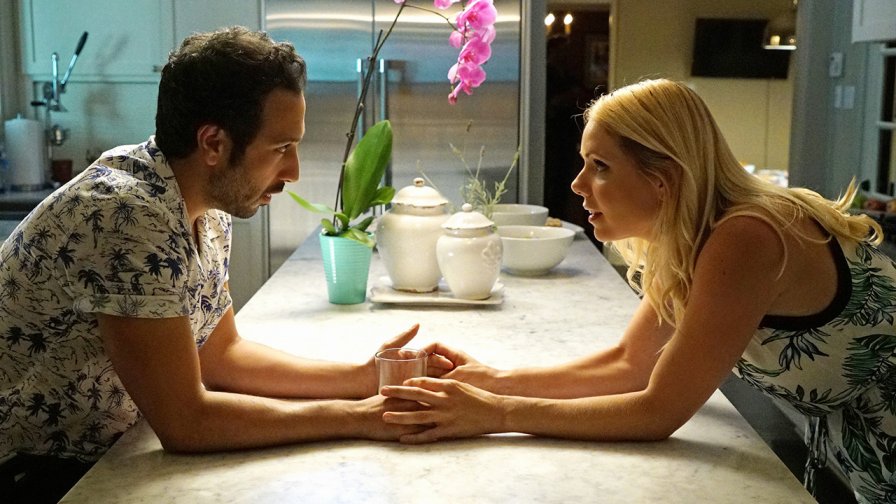
What kind of show is You’re The Worst? How exactly do you classify its all-too-human façade? Unceasingly crass and unpredictably heartfelt, it’s a sitcom built with spectacular new parts, one that does everything a sitcom tries to avoid — and it succeeds in bounds, thanks to its pitch-perfect casting; clever, revealing cinematography; and some of the smartest and funniest dialogue of the year. Like its title, it’s a bit of everything: mean, funny, familiar, maybe a little honest, maybe a little too revealing. In season 2, a few seconds of film linger on Aya Cash’s fading smile to belie a real depression, and a quick shift in Chris Geere’s boyish charm undermines every joke he tells. These are real, messed up, albeit hilarious people, revealed at the strangest moments. Shitty Jimmy is a funny thing to say, but it’s never as funny as when Jimmy’s dad is saying it, you know? On this show, safe punchlines become honest insults; the rudest shit mends your friendships hilariously; and the hanging foam sword of “I’m gonna leave you anyway” starts to look like a real weapon. I keep laughing, with small breaks for sadness. Maybe we’ve got nothing to lose, which is a good thing. Maybe it’s because we all lose no matter what, which is a bad thing. Status quo is underwhelmed. But sometimes there are mini helicopters, Kether Donohue saying “rando,” and friends who bankroll your financial domination fetish. So life’s fine. Vernon, ya BURNT.
13
Making a Murderer
Directors: Moira Demos & Laura Ricciardi
[Netflix]
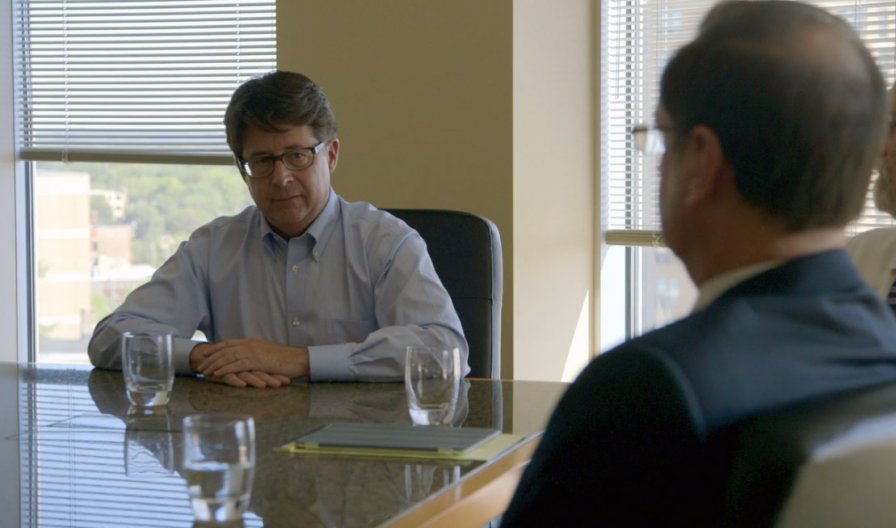
As an individual unit of entertainment, the gritty entanglements of Making a Murderer is a hardbound exposé of a crumbling Wisconsin justice system and the people affected by its ignorance, starring Steven Avery. Although shot like a documentary, it immediately places its pot in the corner of Avery, exonerated rapist whose rise to fame came after 18 years spent as a scapegoat for a crime he didn’t commit. In the macro, Making a Murderer is a must-watch for anyone who believes the justice system is infallible. Through Avery’s complicated familial history, the series attacks our society’s willingness to accept the word of authority at face value without facts. How it does this is completely Hollywood smoke and mirrors: lecherous villains, turncoat kin, inept law officers, and continuous pie-faced justice that’s as heart-on-sleeve as The Good Wife but without the morality and neatly wrapped life lesson. Turns out that Bunim and Murray knew that reality was always stranger than fiction, but Making a Murderer is a real scare. Whether Avery is a murderer is hardly the question these 10 episodes pose; it’s how much are we willing to give up to enjoy the illusion of safety in our own communities.
12
Mr. Robot
Created by: Sam Esmail
[USA]
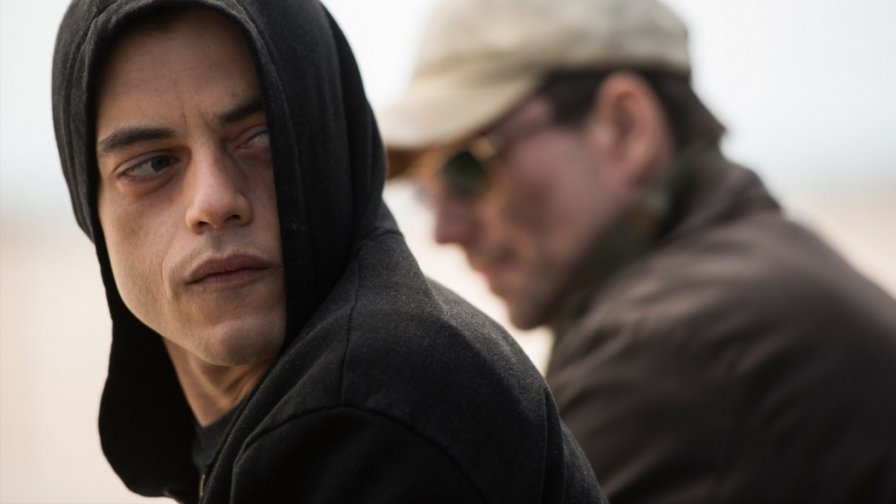
Nothing about Mr. Robot should work. From its thinly veiled repurposing of Fight Club’s anti-corporate psychodrama right down to its parent network, this whole enterprise seemed destined for mediocrity. Rami Malek’s hacker prodigy Elliot should have been another basic cable procedural protagonist dusted with enough neurodivergence to give him an edge, but not enough to tarnish his suitability as a receptacle for our wish-fulfillment. But Elliot’s pain was too real, his loneliness too complete, his paranoia too all-encompassing. Through his quiet vulnerability, Malek pulled us into Elliot’s headspace from the very first scene, and there we remained, if only because the idea of abandoning him in a world so hopelessly off its moorings would have felt like an act of cruelty. Showrunner Sam Esmail has created a place where detours into Lynchian surrealism can exist alongside devastating character moments and edge-of-your-seat heists, all framed in shots that are so glaringly, purposefully askew that they practically shriek the wrongness of the universe these characters inhabit. In a television environment where “shocking” twists have become de rigueur, Mr. Robot felt like a space where truly anything could happen. Welcome to year zero. There’s no excuse for television to ever be the same again.
11
True Detective
Created by: Nic Pizzolatto
[HBO]
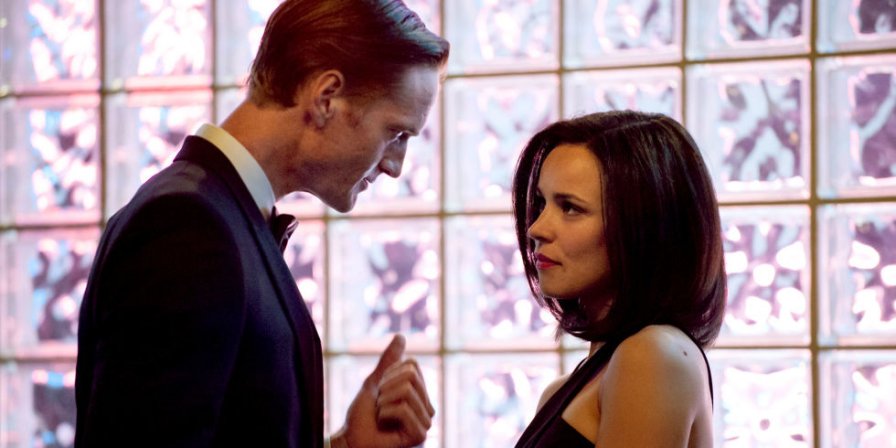
True Detective season 1 was already over for several months before I even considered watching it. Hype was still high and sweaty, inducing some hardline nihilists into heat strokes at its moving finale. At first, I was put off by how generic I imagined a show called True Detective could be, given how easily our collective consciousness is captivated by true crime shit. Turns out I couldn’t be more off base; this show’s a beast, and season 2 was of a vastly different mutation. Where season 1 was brooding and philosophical, season 2 was overtly political and hard as steel. When taken together, though, like a Venn Diagram made up of black, polarized lenses, what shined through was that Truth part. But True Detective’s villainous forces (which possessed corrupt law enforcement, blissfully ignorant citizens, and a society that buries it blemishes so deep that they fester) obscured truth for a desperate chance at longevity, even if that meant living on in a cycle of suffering. Perhaps that’s what burned so many people about True Detective: how close it took you into society’s raging fires. That’s where it left me, and that’s where I write about its truly immersive power.
10
Better Call Saul
Created by: Vince Gilligan & Peter Gould
[Netflix]

Having already turned a mild-mannered school teacher into Satan’s own drug lord, Vince Gilligan pulled a similar trick in Better Call Saul: he turned Bob Odenkirk into America’s best actor. Or near enough, anyway. As a sketch comedian, Odenkirk was the perfect vessel for Gilligan’s love of the hairpin narrative twist, even if the series itself suffered for that at times — where Breaking Bad started with the indelible image of the van in the desert, Better Call Saul defied expectations (as well as attention spans) by opening with a misfiring sub-plot about two identical twin skateboarders. But when the real story eventually came into view, it was presented with refreshing sincerity, as Saul tried to navigate a straight line between his brother’s influence and the cheerful life of a serial con artist. When he found it as the underdog in a fight against a care home scamming its seniors, the series built to one of the great scenes in this fictional universe, an extended nervous breakdown during a bingo game that rivals the work Gilligan and Odenkirk did on Breaking Bad. It’s not all good, man, but mostly it is, and occasionally it’s great.
09
Show Me a Hero
Created by: David Simon
[HBO]

David Simon’s most famous series, The Wire, adapted the 1920s silent film genre of the city symphony for a humanist, and televisual, scale, showing the interconnected dysfunction of Baltimore’s diverse institutions — both officially sanctioned and not. Simon’s unsensationalistic realism felt brave, albeit dissonant, when confronting mythic beasts like Baltimore’s crime and poverty; likewise for his subsequent series Treme, on post-Katrina New Orleans. His new miniseries, Show Me a Hero, on the other hand, approaches — with the same slow precision — a subject that hardly needs tempering: local electoral politics and public housing policy in late-1980s Yonkers. The result was, I’ll say it, Simon’s best work — and worst elevator pitch — to date, turning meticulous debates about urban planning — literally: high rise public housing or smaller apartment building public housing? — into some nail-biting shit. While the most David Simon-y of his creations, it didn’t hurt that each episode was directed by a newly-restrained Paul Haggis and featured a cast including not only 2015’s it-guy Oscar Isaac but also Catherine Keener, Winona Ryder, Carla Quevedo, Alfred Molina, and Jim Belushi. In an era of intricately constructed TV cliff hangers and increasingly sensual direction on the small screen, Show Me a Hero seemed almost old fashioned. Like longform investigative journalism or civil political debate. Put differently, it felt like something new.
08
Bojack Horseman
Created by: Raphael Bob-Waksberg
[Netflix]
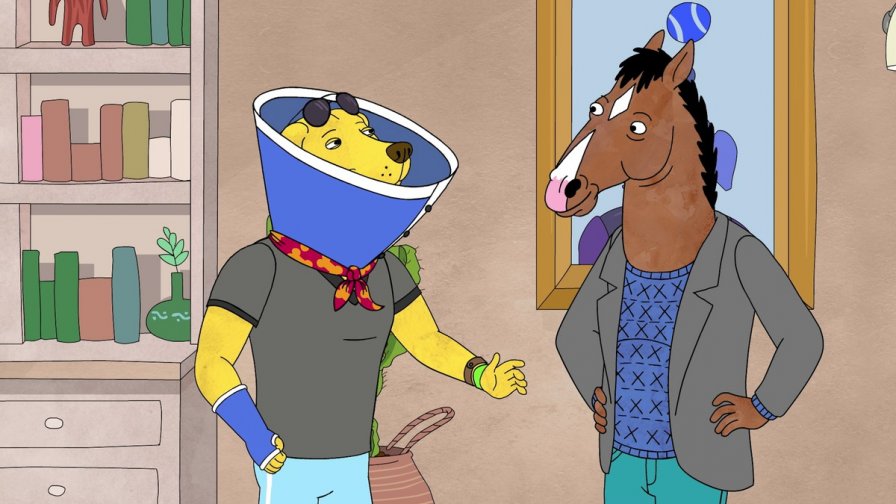
A horse walks into a bar. He stands in the crowded room, alone, thinking to himself: “What happened?” He recounts the efforts he made to better himself, after receiving the role of a… his… lifetime. He recalls his new love, now lost. Wanda: with a troubled past, but resourceful and stronger than him. He thinks of his dead friend and the lack, forever, of resolution. He wonders: “What’s left?” He thinks about his friends and their foibles. His friend, yes, his friend, and how he can get him to come home. “I love you?” Why did he say that, he wonders? “I love you…” He wonders how it came to happen that he could fuck up so badly, lose it all. He tried, he knows: to do better, find love, keep friends, make his fucking film. He flew, oh god, like an asshole out to New Mexico. “A boat? Fuck.” He stands alone. The voices in the bar begin to take on shape, so he walks up to the bar to order a drink, two, however many. The bartender looks at him, curiously, and asks, “Why the long face?”
07
Silicon Valley
Created by: Mike Judge, John Altschuler & Dave Krinsky
[HBO]
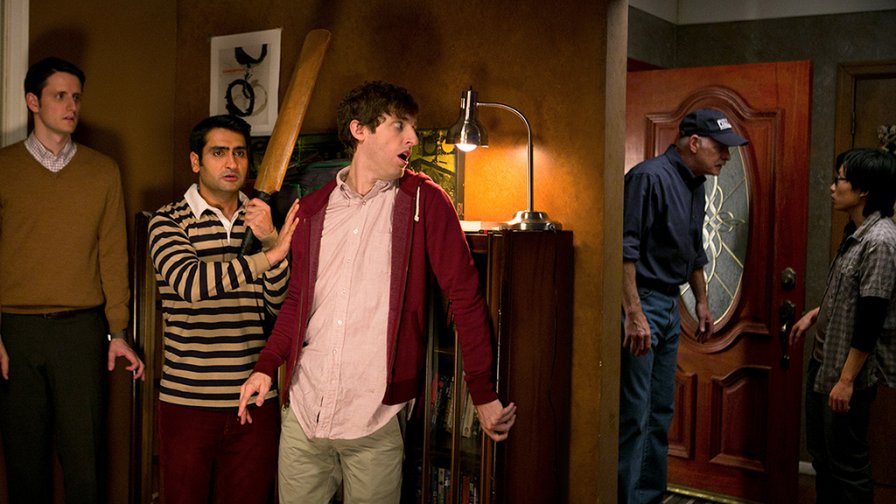
It’s reassuring that with the recent surge of television romanticizing computer culture and recasting the “hacker” archetype into that of the beautiful, tortured weirdo, we’re also seeing the other side of the coin courtesy of Mike Judge & co’s Silicon Valley. The tech world is exciting and high stakes, but like any large industry, it’s also a major clusterfuck in which the brilliant, the inept, the greedy, and the naive are all thrown together, spending way more time dealing with each other’s bullshit than doing any meaningful work. Where shows like Halt and Catch Fire and Mr. Robot seem to have a groundbreaking discovery or world event every episode, Silicon Valley follows just one product rollout, instead finding new ways to frustrate and bog it down week after week. Judge’s satire puts the harsh, annoying truths of the work world on display and shows us the cathartic humor in the absurdity of it all. As the modern portrait of the computer genius skews toward handsome and brooding, it’s nice to be reminded that it can also be some beleaguered schmuck like the rest of us.
06
Halt and Catch Fire
Created by: Christopher Cantwell & Christopher C. Rogers
[AMC]

Beyond the metaphysical significance of home computing, the intellectual properties of Apple, Google, Facebook, and Amazon are also united in the premise that business is spiritual — that happiness is the property of satisfied customers and the shareholders for whom they provide. Herein lay Halt and Catch Fire’s claim to relevance: against this tidy corporate image of commercialized humanism and progressive consumerism, Cantwell and Rogers juxtaposed a messier tale of organizational capital in motion, a story of egotism, betrayal, greed, and failure. If season one was about the reality distortion field and its vicissitudes, all 50 Shades Of Jobs and Fleek Wozniak, HCF’s sophomore go-around pulled the rug from under the feet of its male leads (allowing the crumpled, thwarted Toby Huss time to shine) and let Kerry Bishé and Mackenzie Davis lead the way. The improvement was both organic and undeniable. And yet, and yet… For a show that twists around the impossible relationship between labor and love, it should never have ended as it did. News of a third season is entirely welcome.
05
Game Of Thrones
Created by: David Benioff & D.B. Weiss
[HBO]
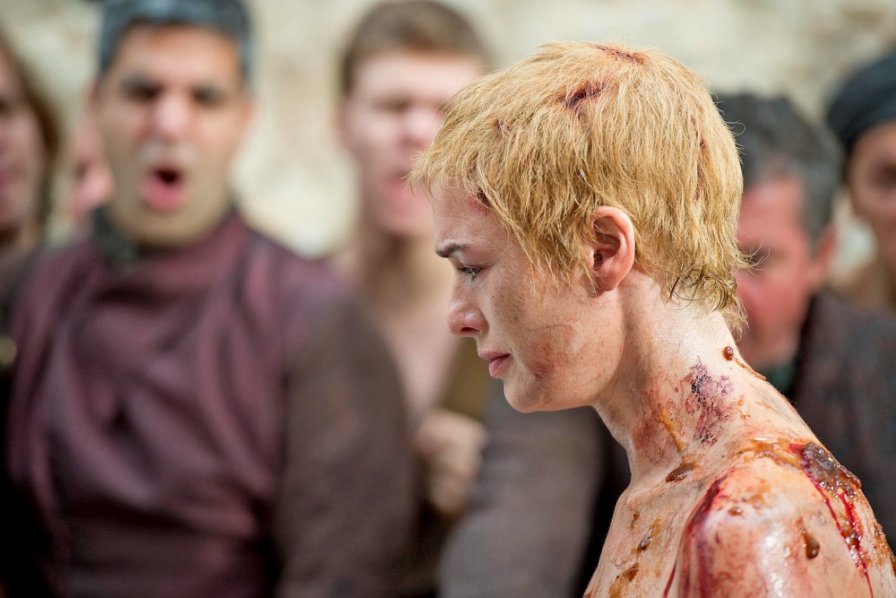
For the watch: a watch that stabs us repeatedly and purposefully, no matter our loyalty. For the spectacle: a creeping and unstoppable army of winter, a healing house of faceless assassins, three-headed fire-breathing dragons. For the performances: Emilia Clarke stirring the embers of Daenerys’ maddening maternal life, Stephen Dillane stealing an exhausted and embattled heroism from the irredeemably written Stannis, Lena Headey walking a fine line through Cersei’s goldcloaked daze. This past season of Game of Thrones might’ve been its most uneven and unfair on a storytelling and story level (the senseless exploitation of Sansa, the punchline plotting in Dorne, the wrong bastard’s Northern triumph). But we pledge our lives to this increasingly joyless show — was there much relief other than Jon and Sam’s friendship? Tyrion and Varys’ banter? — because the stakes and sights are finally matching the doomed heights of the body count, because we still hope against hope for Rhaegar’s poetry, Tolkienian justice, and a binding kind of magic. Or maybe we’re just obsessively blinded by vengeance like Arya. The wind is rising, and the dead too. You should be watching the long night gather with a thousand eyes and one, because TV’s never seen a song like this.
04
Rick and Morty
Created by: Justin Roiland & Dan Harmon
[Adult Swim]

Imagine a show where anything is possible, spanning infinite worlds where the crannies of spacetime knot and unfold into impossible realities, always alongside the inescapable shit of humanity. The second season of Rick and Morty, Adult Swim’s misadventures of an alcoholic super-genius scientist and his reliably below-average grandson (respectively), pushes the delightfully perverse imaginations of creators Justin Roiland and Dan Harmon through multiple dimensions and squeezes out not only reliably insightful and philosophically-ripe science-fiction narratives, but some remarkably tight takes on pop culture phenomena. Rick and Morty’s universe-jumping errands play out in parallel to the domestic mundanities of Morty’s nuclear family, back on Earth-suburbia, and the best bits of the show bring the family’s base insecurities and wants into focus in alien contexts — in a galactic version of the Eurovision song contest; in the boudoir of Rick’s ex-hive-mind girlfriend; in a planetary daycare center for infinite parallel versions of Morty’s sniveling father, Jerry. The show’s humor pits Rick’s existentialist rationale and unapologetic logic against Morty’s retarded 14-year-old morality, dusting the show with a tone both infuriatingly smart and sad. The second season, broadcasted in 2015, ends with a dystopic climax of self-sacrifice and violence that threatens not only Morty’s family, but also the order of the universe. With a host of alien characters voiced by an impressive guestlist — including Nathan Fielder, Werner Herzog, Christina Hendricks, and Patton Oswald, to name just a handful — and animated in a Simpsons-meets-Adventure Time style, Rick and Morty is a classic in its own spacetime.
03
The Knick
Created by: Jack Amiel & Michael Begler
[Cinemax]
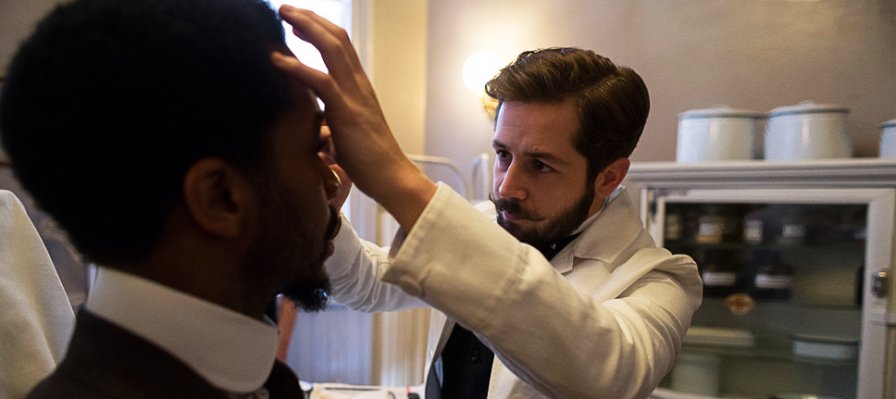
Having already firmly established the morality and regulations, or lack thereof, of The Knickbocker’s surgical rooms and administrative corridors in its fantastic first season, Steven Soderbergh’s gripping period drama busted those hospital doors wide open in its second season, extending its roots into every crevice of early 20th-century New York City society. When it wasn’t thrilling us with Thack’s increasingly reckless yet mostly successful surgical wizardry, The Knick tackled everything from women’s rights, immigration, and eugenics to religious zealotry, fraud, and race relations. Cliff Martinez’s pulsating, futuristic score and Soderbergh’s ever-inquisitive camera breathed energy and life into a genre often tedious and dry, creating a world that felt of-its-time yet accessibly modern. And it’s no wonder, as The Knick, despite being set over one century ago, shined a mirror that very delicately and subtly reflected our own times, as it quietly became one of the most socially and politically relevant shows on television.
02
Mad Men
Created by: Matthew Weiner
[AMC]

Speculation was rampant in the run-up to the final episode of Mad Men. Fans of the show scanned each frame for portents that Don Draper would suffer a total breakdown and become the “falling man” of the opening credits or that Megan Calvet would be hacked to pieces by a horde of Manson Family acolytes. These prophecies ultimately proved to be without merit, but their existence calls up an interesting question: what kind of show did these people think they were watching? Surely after six and a half seasons, nobody in their right mind could mistake Matthew Weiner for someone who would end his masterwork on a ham-fisted suicide or wholly implausible cult murder. But Mad Men was always a show that defied idle speculation or fanboyish recapping. It was the last of the small handful of truly ambitious shows that emerged in the wake of The Sopranos, television that was willing to turn an all-encompassing eye on Western society and the institutions that undergird it, and force upon viewers the knowledge that the whole thing is an utter fabrication, rotted hollow from its foundations.
01
Nathan for You
Created by: Nathan Fielder & Michael Koman
[Comedy Central]
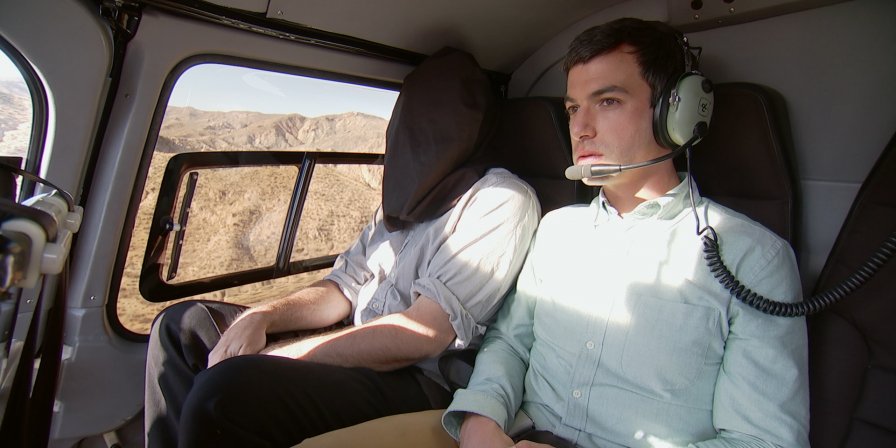
Nathan Fielder knows that TV changes lives. He’s like Ed McMahon with an oversized check at your door — except it’s not Ed McMahon, it’s a terrified nebbish with really good grades from one of the top business schools in Canada; and it’s not a check, it’s a paper bag filled with shit lit on fire; and it’s not a door, it’s your sense of consequence and continuity and trust and agency. An impressive accomplishment for a cable prank show whose first moments involved selling poo-flavored frozen yogurt. On Nathan For You, “reality television” loses any connotation of oxymoron, as Fielder packs the gap between the real world and the small screen with ample paratextual insulation. He’s made life as exciting as TV and vice versa, all mounting to the alarming snowclone: it’s Nathan’s world, we just live in it.
In its third season, the genre-defying (it is a “prank show” as much as Seinfeld was about nothing) phenomenon continues to unveil just how long and elaborate this con is. The simple conceit — Fielder offers struggling small businesses a harebrained makeover — has developed into seasons-spanning, news-making, life-changing commentary on and mobilization of the multi-platform, life-size situation comedy the world has become. It seems that Fielder has crafted his own self-contained universe until you remember that all its tiny moving parts are real people doing real-ish things. As the callbacks from its cast of they-can’t-be-real weirdos and surely-this-is-fake-who-am-I? pranks became more and more intricately tangled, it would be hard to believe that any of this was more than a big hoax if you weren’t already caught up as one of his eager dupes. His knack for going viral, Kardashian in scale, and Kauffman-esque in form drew attention to how easy it is to target a culture that’s primed to believe the hype.
But even as we buy into his ruse, Nathan For You makes known that the people it fooled were never really that as a noun. They are, like Fielder himself, ingenuous losers, looking for love and acceptance and sometimes getting strung along a bit to get there. Whatever shtick he may put on, Fielder is no doubt still an IRL big weird dog who needs a nice pat on the head when things get tough. Staging a slice-of-life play to sidestep a smoking ban in one of the season’s finest episodes, Fielder writes his own validation into the dialogue. Teary-eyed at the scripted praise, he notes “They say reality is what you make of it, so in a world that’s cruel and hurtful, who’s to say mine can’t be nice,” a quote so unnervingly on the $$$ that I have to assume it was written for its inevitable inclusion on EOTY lists.
For the baby signs lit up in our eyes, it can be easy to overlook the awe-inspiring humanity of Fielder’s stunts, which even at their cringiest note that you’re not an idiot for being made a sap. He never goads his marks into looking stupid; he merely lets the camera linger long enough to catch the candidness that we so rarely see in a time when Instagram filters are only the most literal of our endless means of self-mediating. The greatest trick Nathan For You pulled was convincing the world it was jerking our chain anymore than we do ourselves anytime we get something #trending. Yes, he wields an improbable amount of power for a cable TV host whose grades weren’t even that good, but he mostly uses it remind us of the not immodest dignity of being a dork.
More about: 2015
Welcome to Screen Week! Join us as we explore the films and TV shows that kept us staring at screens. More from this series



